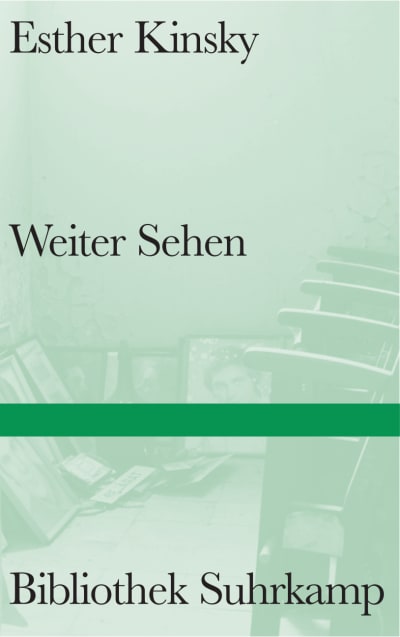USA & Canada (NYRB), UK & Commonwealth (Fitzcarraldo), Spanish world rights (Periférica), Portuguese rights (Elsinore), France (Christian Bourgois), Italy (Iperborea), Netherlands (Pluim), Hungary (Jelenkor)
Esther Kinsky’s powerfully eloquent and pictorial declaration of love to the cinema – moving and highly topical
»Where to turn one’s gaze?«
»The cinema as support, as a companion for everybody, as a guiding star and escort, a refuge for everyone, a place that offered shelter for countless solitudes, hopes, dreams, a shelter with a view.«
On a journey through the south-east of Hungary, the narrator stops off in an almost completely deserted village on the border to Romania. Resignation and a glorification of the past are the most dominant threads in the inhabitants’ conversations. Like many other things, the cinema, »Mozi« in Hungarian, has long since closed. Once the centre of the village, the only important role it plays now is in the stories and memories of those who remain. Her own passion for the cinema...
On a journey through the south-east of Hungary, the narrator stops off in an almost completely deserted village on the border to Romania. Resignation and a glorification of the past are the most dominant threads in the inhabitants’ conversations. Like many other things, the cinema, »Mozi« in Hungarian, has long since closed. Once the centre of the village, the only important role it plays now is in the stories and memories of those who remain. Her own passion for the cinema moves the narrator to bring the decaying »Mozi« back to life.
In her new book, Esther Kinsky talks about the irresistible magic of the cinema, a place »where humour, horror and relief found communal expression without threat to the anonymity of the darkened room«. Running underneath the fervent enthusiasm for the cinema and reflections on the »great temple of moving images« is the question: how »seeing farther« and talking about it possible when the site of a shared experience has been dismantled in favour of the privatisation of life and experience?
»The plan to establish a cinema in the Hungarian hinterland fails. ... The author is left with the task of finding appropriate words for the loss of culture. She succeeds in doing so in captivatingly beautiful language.« Carsten Otte, Der Tagesspiegel
»A lifelong dream: to revive a dilapidated cinema in a godforsaken place. Esther Kinsky realises this dream with her weightless sentences.« Nico Bleutge, Süddeutsche Zeitung
»Esther Kinsky has written a masterwork of melancholy.« Carsten Otte, SWR2
»... a powerfully eloquent and ingenious homage to this dying cultural form ...« ORF
»Esther Kinsky has created a literary oeuvre of impressive stylistic brilliance, thematic diversity and stubborn originality. [...] It is always clear that for her the only landscape worth describing is the one in which she is currently situated. Far from ›eco-dreaming‹, without sorrow or critique, Kinsky’s novels and poems position humanity in relation to the ruins it has produced and what still remains of nature.« 2022 Kleist Prize Jury
»The plan to establish a cinema in the Hungarian hinterland fails. ... The author is left with the task of finding appropriate words for the loss of culture. She succeeds in doing so in captivatingly beautiful...
DISCOVER
Just published: Suhrkamp Authors Around the World – February 2024, issue 2
We are delighted to present to you our latest arrivals!DISCOVER
Just published: Suhrkamp Authors Around the World – February 2024, issue 2
We are delighted to present to you our latest arrivals!Persons
Esther Kinsky
OTHER PUBLICATIONS

Home
Images of flight, dispossession, and injury, spanning millennia, in history and myth: Eurydice, frantically fleeing from a god that is stalking her, fails to notice the serpent and dies from its poisonous bite. Landless cottagers in northern Scotland, relocated to less fertile land or forced to emigrate. A young German nobelwoman, educated and gifted, resists the »given«, the »morals of...

The Captain and Mimi Catt

Rombo
USA & Canada (NYRB), UK & Commonwealth (Fitzcarraldo), Spanish world rights (Periférica), Catalan rights (Angle), Portugal (Elsinore), France (Christian Bourgois), Italy (Iperborea), Netherlands (Pluim), Denmark (Atlanten), Norway (Forlaget Press), Finland (Lurra), Japan (Hakusuisha), Poland (Drzazgi), Turkey (Axis)

Slates
Esther Kinsky’s new book is dedicated to slate, the polymorphic, versatile sedimentary rock, and to the Slate Islands, a small archipelago off the West coast of Scotland. For centuries, slate was...
France (Editions Grèges)

Grove
Grove is a novel in three parts, each following a different journey through...
UK & Commonwealth (Fitzcarraldo), USA & Canada (Transit Books), Spanish world rights (Periférica), France (Grasset), Italy (Il Saggiatore), Netherlands (Pluim), Denmark (Atlanten), Finland (Lurra), Korea (East-Asia Publishing), Greece (Potamos), Ukraine (Knihy XXI)


